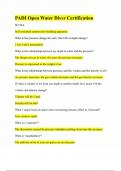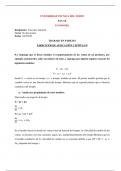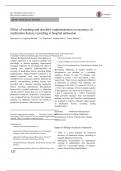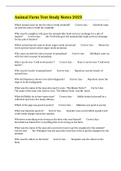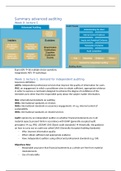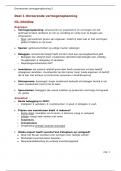Whole summary medical genomics
PART 1 LECTURES
Lecture 1 course overview
What is genomics?
- Study of entire genomes
- Many implications for life sciences and medicine
- Not limited to human genome
What is medical genomics?
- Aspects of genomics that have powerful applications in medicine and health care
- For example:
o Whole genome sequencing
o Genetic variants
▪ Relevance in clinical diagnosis
▪ Using variation as a tool (‘genetic markers’)
o Human disease gene identification
▪ Mendelian traits
▪ Complex traits
o Making disease models using model organisms
o Gene therapy and stem cell therapy
Sequencing the human genome
- Human genome organization founded: 1988
- First complete draft of the human genome published: 2001
o A 13-year puzzle
Sequencing SARS-CoV-2
- First complete genome sequence of SARS-CoV-2 published: January 2020
Emerging technologies
- A South Korean company named SOOAM offers dog cloning services for pet owners. The
cloned animals greatly resemble their ancestors, but they are raised differently.
- (Animal cloning is prohibited in the Netherlands, but legal in South Korea)
Application of genomics in medicine
- Diagnostics of inherited diseases
- Genetic counselling
- Disease pathology research
- Disease treatment (pharmacology, gene therapy, stem cell therapy)
,What is a genome?
- A genome contains all the biological information needed to build and maintain a living
example of that organism
Human genome characteristics
- 23 chromosome pairs:
o 22 autosome pairs
o Two sex-linked chromosomes: X & Y
- 3.2 * 109 bp
The 4 bases in DNA
- Purines: A and G
- Pyrimidines: C and T
Structure of a nucleotide
- Nucleotide
o Phosphates
o Nucleoside
▪ Base
▪ Sugar
- Nucleotides are connected via phosphodiester bonds
- Sugar and phosphate groups form the backbone of the DNA
Central dogma
- DNA -> transcription -> RNA -> translation -> protein
Genes and regulatory sequences
,Gene organization
- Prokaryotes
o Operons
o Polycistronic mRNAs
o Little RNA processing
o DNA in cytoplasm
- Eukaryotes
o Single genes
o Monocistronic mRNAs
o Heavy RNA processing
o DNA in Nucleus
Gene transcription
- DNA is being transcribed into RNA
o This means that the T in DNA turns
into U in RNA
- One gene / many proteins
o In eukaryotes, alternative RNA
splicing increases protein complexity
Translation
- mRNA is turned into a genetic code
o genetic code = amino acids
Amino acid structure
Protein structure classes
, Lecture 2 Genome structure, sequencing & PCR
DNA structure is organized in a dynamic way
- Interphase
- Prophase
- Metaphase
o Metaphase chromosomes: most compact
- Anaphase
- Telophase
- Interphase
o Interphase: most cases: DNA is accessible for duplication
- During cell division: more compact
nucleus
- nucleolus: more condensed area of the nucleus
o RNA factory for:
▪ rRNA (ribosomal RNA)
▪ tRNA
▪ snRNA molecules
- Different degrees of DNA condensation, visible in
electron microscopy
- Heterochromatin:
o electron-dense
o tightly packed
o inert
o Not a lot of biochemical activity
- Euchromatin:
o less electron-dense
o dispersed (not tightly packed): more accessible and open
o transcriptionally active
Chromatin condensation
- DNA is compacted on multiple levels:
A) The double helix (2 nm)
B) Nucleosomes (11 nm)
C) Chromatin fiber (30 nm)
D) Chromatin coil (300 nm)
E) Chromatin coiled coil (700 nm)
F) Metaphase chromatid (1400 nm)
Base pairing in a double helix
- Two DNA strands form a stable structure
- Base pairs of opposing strands have to match
- An A-T pair forms 2 hydrogen bonds
- A C-G pair forms 3 hydrogen bonds
- Antiparallel facing but parallel to each other
PART 1 LECTURES
Lecture 1 course overview
What is genomics?
- Study of entire genomes
- Many implications for life sciences and medicine
- Not limited to human genome
What is medical genomics?
- Aspects of genomics that have powerful applications in medicine and health care
- For example:
o Whole genome sequencing
o Genetic variants
▪ Relevance in clinical diagnosis
▪ Using variation as a tool (‘genetic markers’)
o Human disease gene identification
▪ Mendelian traits
▪ Complex traits
o Making disease models using model organisms
o Gene therapy and stem cell therapy
Sequencing the human genome
- Human genome organization founded: 1988
- First complete draft of the human genome published: 2001
o A 13-year puzzle
Sequencing SARS-CoV-2
- First complete genome sequence of SARS-CoV-2 published: January 2020
Emerging technologies
- A South Korean company named SOOAM offers dog cloning services for pet owners. The
cloned animals greatly resemble their ancestors, but they are raised differently.
- (Animal cloning is prohibited in the Netherlands, but legal in South Korea)
Application of genomics in medicine
- Diagnostics of inherited diseases
- Genetic counselling
- Disease pathology research
- Disease treatment (pharmacology, gene therapy, stem cell therapy)
,What is a genome?
- A genome contains all the biological information needed to build and maintain a living
example of that organism
Human genome characteristics
- 23 chromosome pairs:
o 22 autosome pairs
o Two sex-linked chromosomes: X & Y
- 3.2 * 109 bp
The 4 bases in DNA
- Purines: A and G
- Pyrimidines: C and T
Structure of a nucleotide
- Nucleotide
o Phosphates
o Nucleoside
▪ Base
▪ Sugar
- Nucleotides are connected via phosphodiester bonds
- Sugar and phosphate groups form the backbone of the DNA
Central dogma
- DNA -> transcription -> RNA -> translation -> protein
Genes and regulatory sequences
,Gene organization
- Prokaryotes
o Operons
o Polycistronic mRNAs
o Little RNA processing
o DNA in cytoplasm
- Eukaryotes
o Single genes
o Monocistronic mRNAs
o Heavy RNA processing
o DNA in Nucleus
Gene transcription
- DNA is being transcribed into RNA
o This means that the T in DNA turns
into U in RNA
- One gene / many proteins
o In eukaryotes, alternative RNA
splicing increases protein complexity
Translation
- mRNA is turned into a genetic code
o genetic code = amino acids
Amino acid structure
Protein structure classes
, Lecture 2 Genome structure, sequencing & PCR
DNA structure is organized in a dynamic way
- Interphase
- Prophase
- Metaphase
o Metaphase chromosomes: most compact
- Anaphase
- Telophase
- Interphase
o Interphase: most cases: DNA is accessible for duplication
- During cell division: more compact
nucleus
- nucleolus: more condensed area of the nucleus
o RNA factory for:
▪ rRNA (ribosomal RNA)
▪ tRNA
▪ snRNA molecules
- Different degrees of DNA condensation, visible in
electron microscopy
- Heterochromatin:
o electron-dense
o tightly packed
o inert
o Not a lot of biochemical activity
- Euchromatin:
o less electron-dense
o dispersed (not tightly packed): more accessible and open
o transcriptionally active
Chromatin condensation
- DNA is compacted on multiple levels:
A) The double helix (2 nm)
B) Nucleosomes (11 nm)
C) Chromatin fiber (30 nm)
D) Chromatin coil (300 nm)
E) Chromatin coiled coil (700 nm)
F) Metaphase chromatid (1400 nm)
Base pairing in a double helix
- Two DNA strands form a stable structure
- Base pairs of opposing strands have to match
- An A-T pair forms 2 hydrogen bonds
- A C-G pair forms 3 hydrogen bonds
- Antiparallel facing but parallel to each other

